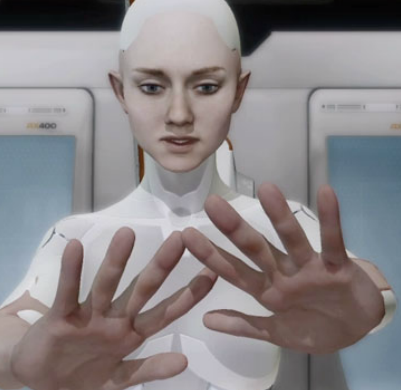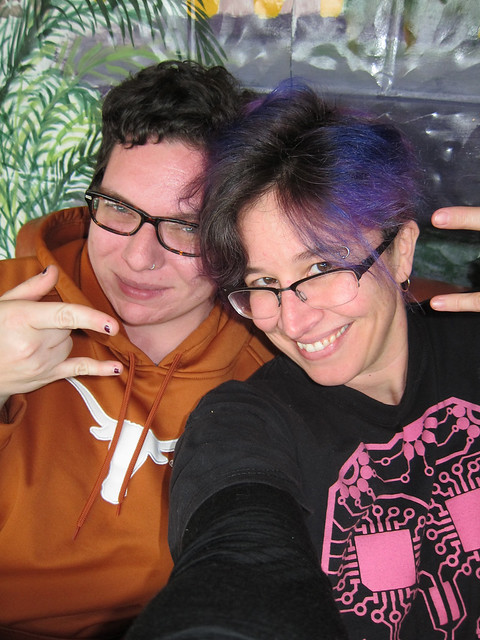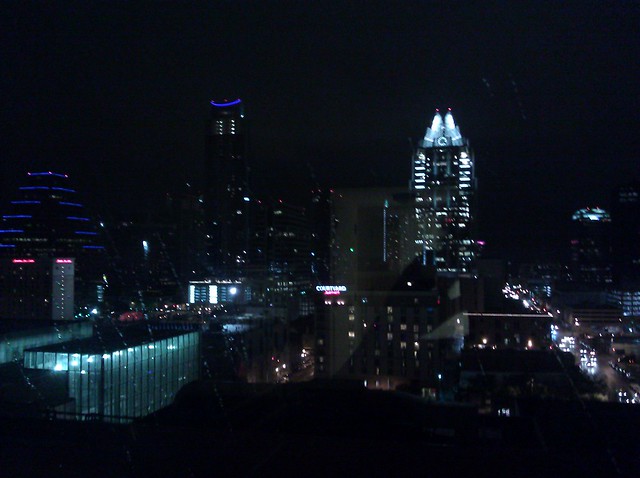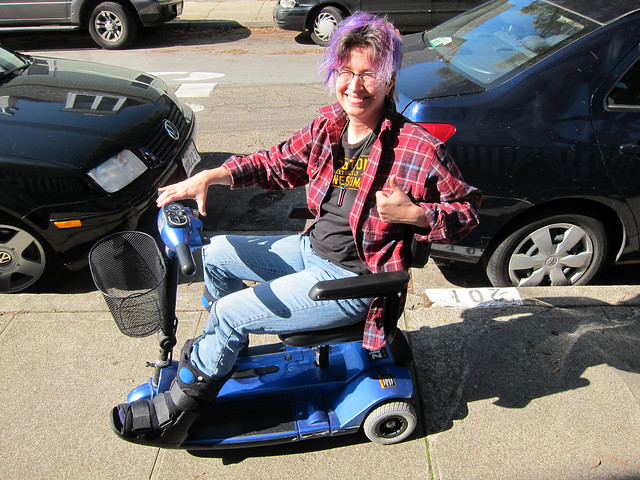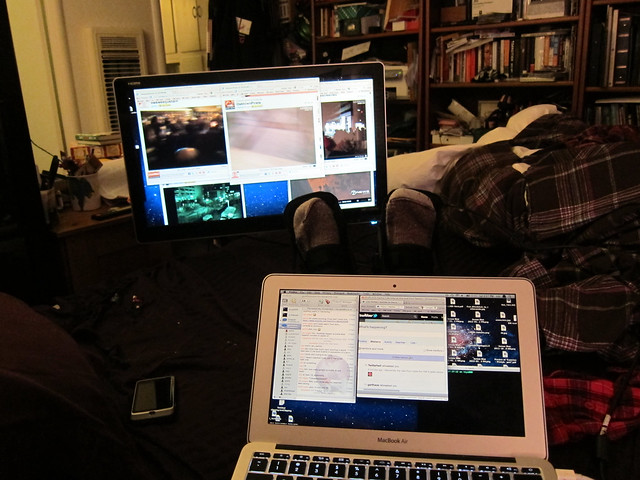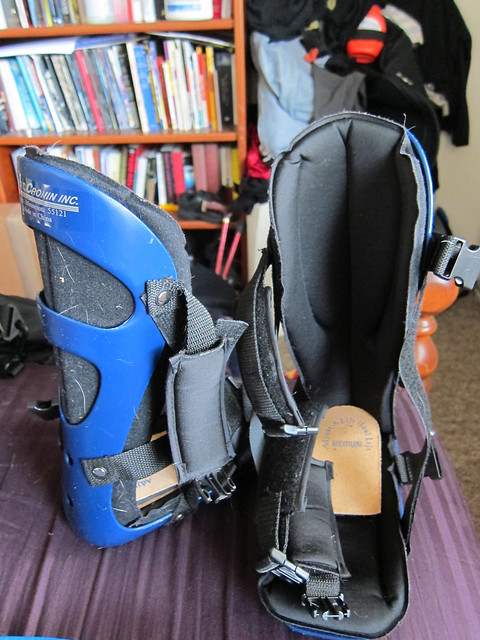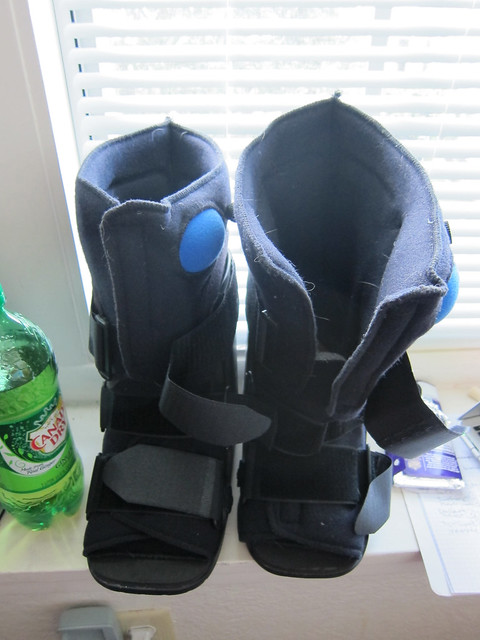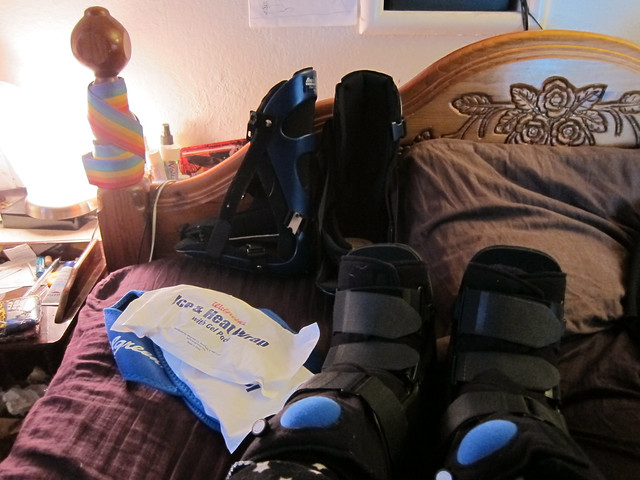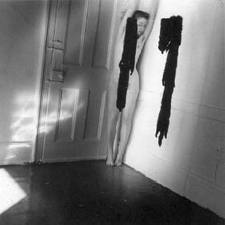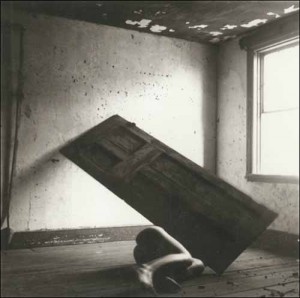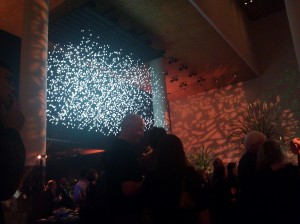It’s amazing how only two suitcases can explode over a hotel room in stratigraphic layers of gadgets, papers, cords, chargers, cookies, postcards, tshirts, teacups, leg braces, books, and handkerchiefs-and-underwear washed in the sink hung out to dry. I have a fabulous view out the window of beautiful brick rooftops and the dome of the British Museum, which is lucky since I’m spending a lot of this trip to London lying in bed with my feet up on pillows!
I really enjoyed The Story. Eighteen of us told 20-minute stories one after the other, and it was never boring! It was like being inside a real-life anthology carefully edited by Matt Locke. As the day went on the bigger and somewhat inchoate Story began to emerge from the selection of individual stories told. I’m not sure what that big story is. It had the feeling of a thing that’s too new to be named, something diffuse that’s popping up rhizomatically in many different gardens, or something invisible and huge that we’re all trying to harness and ride. It felt like a story about the possible future.
I’m sure it’s unfashionable to be earnest about something so pomo. But that’s how I respond to anthologies. They’re about an unnameable shape and their pleasure for me is in trying to wrap my mind around that emerging shape.
My talk, “Fake Lesbians All the Way Down” was on last year’s blogging hoaxes (Gay Girl in Damascus and Paula Brooks/LezGetReal) and while I tried to make it a personal story about the process of doubting and then investigating particular identities, being lost in a labyrinth of identities and sources and histories, what I wanted to convey was not my personal experience or drama or a homily about Syrian activists in danger (which does trump the rest of the story). I wanted to convey an instance of what it means to read a story actively, to engage with a “difficult text”. Whatever people got out of it, the gossipy pleasure of Internet Drama and so on, I think I represented a good piece of the puzzle, one with swirly doubts, complexities and difficulty, that you can’t read without being drawn in to be part of it.
Other stories: Jeremy Deller‘s historical re-enactment of The Battle of Orgreave, part of the miners’ strike in 1984; Matthew Herbert‘s experiments with sound as story (I was overcome with sudden nostalgic desire to hear the sounds of a city street in 1982); Ellie Harrison‘s playful, scarily and wonderfully OCD manifestations of enormous personal and political data sets; Tom Chatfield and Phil Stuart on the narrative tricks of their video game for children on philosophy and death; Tom Watson and Emily Bell on the story of sticking with the unfolding phone hacking scandal; and Danny‘s wrap-up story about Anarchy, the Universe, Occupy, Hackerspaces, Open Source, the Internet, and Everything — and too many other talks to go into in one blog post.
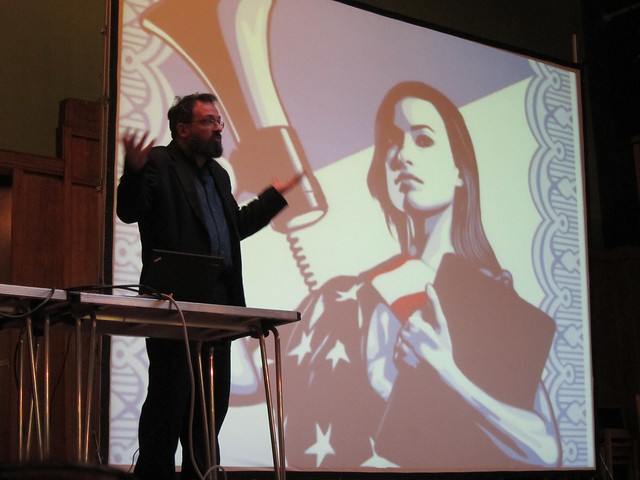
I loved how interested the audience was, how everyone was listening very hard, and talking about it all on the breaks and afterwards, with more than idle curiosity — a bit more like being at a science fiction convention where you know you are among other people who really love Whatever It Is, than like being at a tech conference where half of it is necessarily about networking and pushing your startup or getting a job. Maybe that view is because as an outsider to this scene, the networking bit was invisible to me. Still, it felt like most of the people there were story-lovers and creators who had the capacity to listen with complexity.
Also, how awesome was it that the conference schedule was printed IN CHOCOLATE?
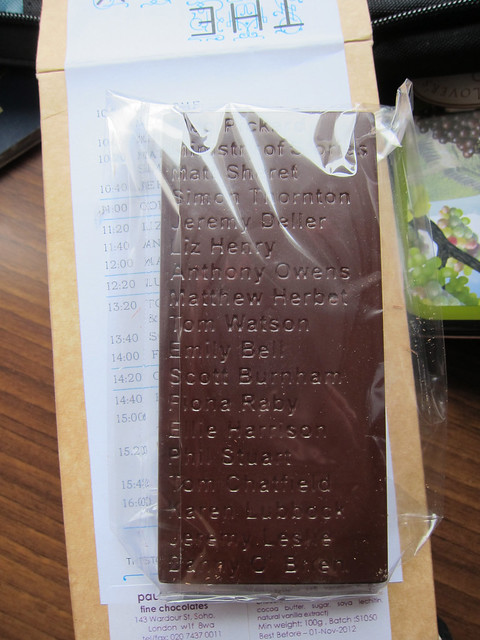
The night before the conference there was a dinner for the speakers, and for me the highlight was talking with Matt Sheret not just about our own upcoming talks but also in depth about zines, anthologies, books, stories and games including role playing games and MUDs. We had something of a shared experience of the ways role playing games, especially as collaborative stories extended over months or years, pull people together socially and the depth of community & friendships they can create.
I have to add a few ill mannered words though, because it is part of my role as an imported American to stomp around, braying gracelessly. And it’s not like, when I see the dumbest thing I’ve ever seen and the most ripe for mockery, I can keep my mouth shut about it! One talk made my head explode with rage so much that I was glad it was there as a bad example, as the utterly wrong kind of story and story telling. So while I don’t want to be mean to the perfectly nice person exemplifying this, I must slam the subject of her talk. /end disclaimer
Fiona Raby gave a sort of “multimedia presentation” (and I mean that in all the ways one might itch all over at a badly “interactive” museum exhibit) of a vision of the future in 2050 of humans as “Foragers“. Without any apparent knowledge of the enormous amount of science fiction and futurist thought of actually creative and visionary people on this subject, some design consultancy in South Africa poured out buttloads of money to come up with the Art Concept of how in 2050 the Earth’s 9 billion people will need to be fed. Oh, no one has ever pushed the boundaries of thought about THAT before, for fuck’s sake! Anyway, the Foragers will be genetically engineered with handwavium to have external stomachs around their necks like inner tubes and will have prosthetic arm extensions to vacuum up and digest common weeds and the leaves of trees (in order to preserve biodiversity rather than having nothing but soy crops) whilst wearing Nikes and fashionable track suits because globally industrialized consumer capitalism is still going strong and nothing else about the world has changed other than “9 billion people” and “we still have brand name sneakers”. This, presented as radical conceptualization of the future rather than as just freaking lazy. Swoopy drawings of the foragers and then some people cosplaying foragers with long green sleeves, masks, and inner tubes around their necks in a skanky vacant lot under some pylons (with the people playing frisbee in the background hailed as more radical conceptualization of the normal human activity taking place as foragers forage, and the snapshot-level quality of the photos lauded as brilliant camera work. Interspersed with “science” bits about how (news flash!) Scientists have discovered (recently!) that there are certain plants… (peas… fancy that!) that “put Nitrate” into the soil and useful crops could be genetically engineered to splice that capability in.
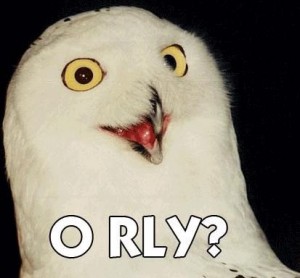
THEN… as if that were not enough crime… they hired a hack writer to drivel on about the last butterfly being accidentally Foraged off an oak leaf, and then printed a few paragraphs of that drivel in 5 inch high plastic three dimensional letters (in a special font) which were artily placed on an art gallery floor so that they (radical concept!) were only readable in a linear fashion from a particular perspective. There is also a video or three and some computer animation. I could almost forgive the whole Foragers thing as a clumsy, naive, beginner’s attempt at science fiction, if not for the obviously obscene amount of money an enormous amount of useless people sucked off some governmental/NGO tit to produce this 5th-rate bullshit. I have to be harsh, because to me this is exactly the most horrifying process of producing and telling a story, as well as being a bad story.
Anyway!
On Sunday I went to the London Hackspace to have a tour. It was amazingly like Noisebridge in San Francisco, but somewhat quieter and with less people trooping in and out.
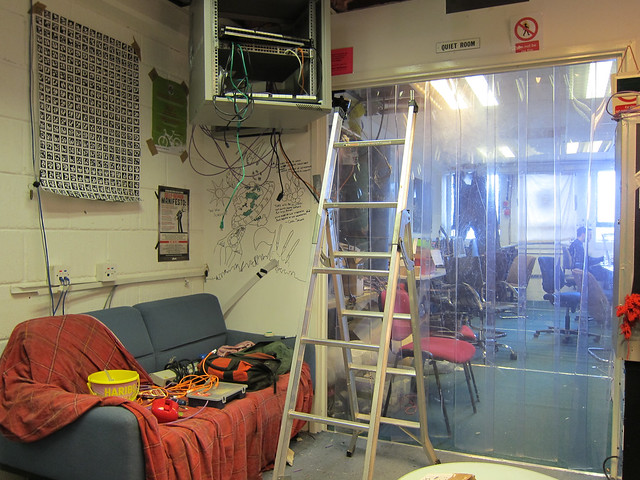
I loved how familiar it was, I loved the clutter and mess (which to me is richness and depth), the 3D printers, computer equipment and half-finished projects everywhere, cables hanging down from the walls and ceiling, murals of robots, enormous wood shop full of tools and scraps, and most of all the little flyers and bits of tape everywhere exhorting people to clean up, put your stuff away, put tea cups here, how to use this particular machine without cutting your hands off, organizational systems carefully created for the screwdrivers, and NO SLEEPING signs, because they are common to co-ops and collectives everywhere and their evident frustration is so touching an attempt to believe in human virtue.
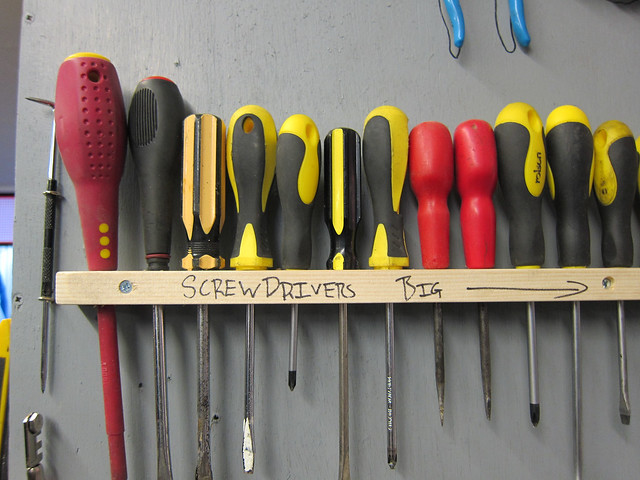
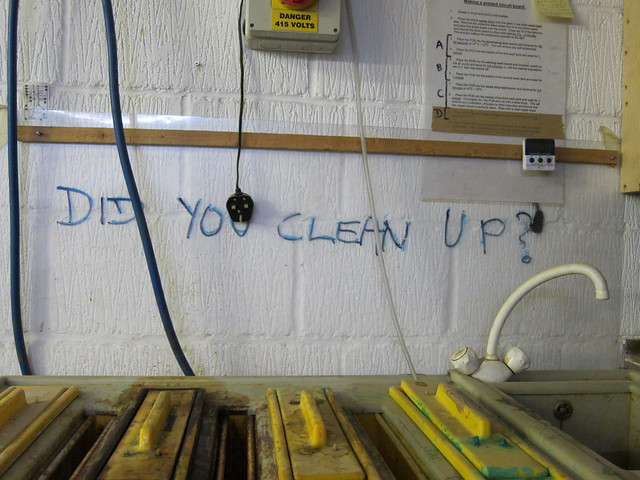
With amusing naivete I had made the mistake of, while crippled and in theory “resting”, trying to keep up with Coryand Alice for an entire day. I have been in bed ever since. I really enjoyed Shoreditch House, the office with all those fascinating things and the astroturf balcony and back issues of Punch and the Whole Earth Catalog and lots of great science fiction, the hackspace, that awesome Vietnamese restaurant, both levels of Forbidden Planet, and that one store with the fancy leather coats.
Meanwhile — my beautiful view of rooftops from the hotel window led me to a small ridiculous epiphany. As I grew up reading everything including a ridiculous amount of British literature the word “chimneypots” meant something completely abstract to me. An architectureal feature of some sort that is part of a chimney or maybe just a weird old word for chimneys themselves. Of course looking out this window there are actual pottery things that look like flowerpots sitting on top of brick chimneys. Mindblowing! And they’re so lovely! I wish I could convey how smug I feel at this realization of how imaginary these objects were to me and how mundane they obviously must be to people here. Now I have a thing to the name, have read the Wikipedia entry for chimney pots (theory and history of) and have found 52 page pdf parody history of the fine old sport of Chimney Pot Spotting; I believe I’m looking at a Tadcaster Stoat and a Manly Bovington right now!

Oh! And! Two people (at least) drew cartoons of the speakers at The Story: sketch by Francois Jordan and another by Drawnalism. And… I wanted to mention that it was all a fundraiser for the Ministry of Stories which runs writing workshops for kids and has a storefront — The Monster Shop — run on the same sort of model as 826 Valencia and The Pirate Store.
